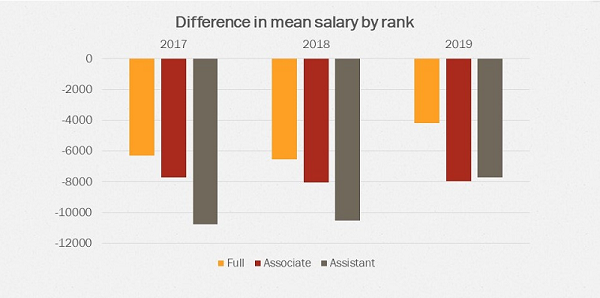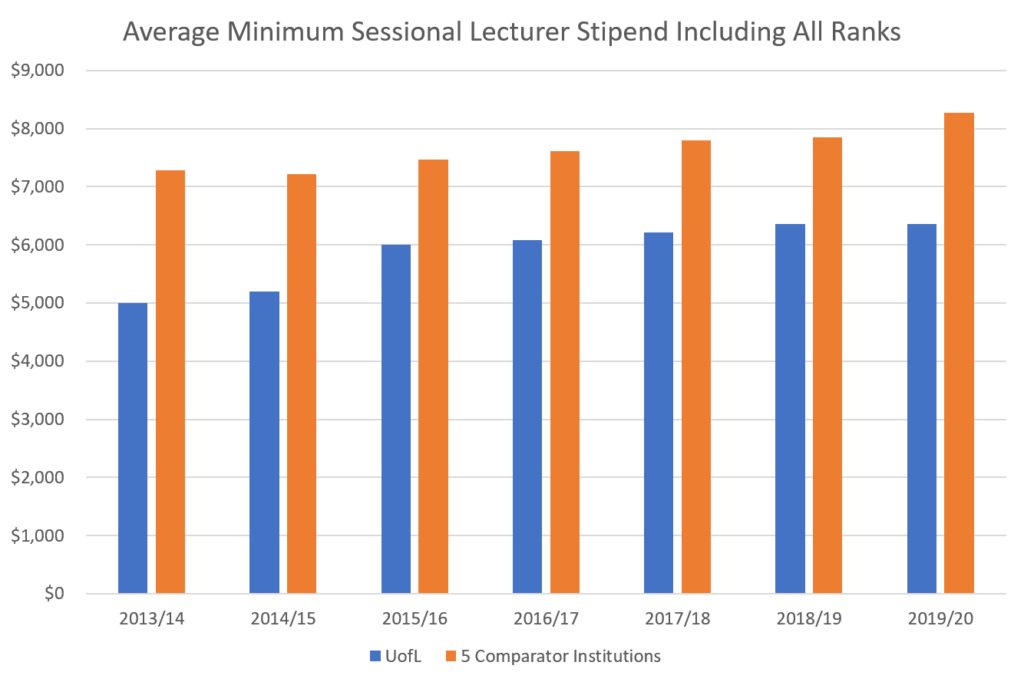After a good discussion at the Annual General Meeting, held on April 6, the ULFA membership approved a bargaining mandate for the ULFA negotiating team with 94% of the membership in favour.
The bargaining mandate was prepared by ULFA’s Bargaining Resource Committee following extensive consultation, including approximately 100 one-on-one member interviews, several town halls, and a survey completed by roughly ¾ of the membership. Aspects of the draft mandate were discussed with members of the Gender Equity and Diversity Committee. The draft mandate was then provided for comment to the Negotiating Team, which will carry out the actual negotiations, before being finalised, approved by the Executive Committee, and presented to the membership for a vote at the Annual General Meeting.
The complete Bargaining Mandate is included below, the highlights include:
Demands to address salary and benefit erosion that has occurred over the past several years.
As Bob Barnetson has noted in his blog, Alberta public servants of all kinds, including ULFA members, have seen no cost of living increases since 2017, resulting in an erosion of spending power relative to inflation of at least 3.7%. ULFA members have also lost relative to their colleagues at peer institutions. Uniquely among the faculty of the province’s Comprehensive Academic and Research Universities (CARUs), U of L faculty took a 1% wage rollback to assist the University during the last Conservative government budget cutbacks in 2013. The U of L consistently underperforms its main comparators in terms of faculty compensation at all ranks.


The five comparator institutions, agreed upon with the employer, are UofA, UofC, Trent University, UofR, and UofS.
Demands to address deficiencies in benefits
There has been little progress in addressing problems with our benefits over successive rounds of negotiation. The members have consistently noted the shortcomings of our vision care and dental care benefits. There is also a clear inequity where benefits are reduced when two parents are Members of ULFA. Finally, professional development funds should be restored for tem instructors and created for sessional lecturers for each course they teach.
Demands to address workload
After much discussion, the Membership has determined to maintain current workload and to achieve equitable workload assignments for all Members. To support this demand, ULFA must receive clear data on workload levels across all units and faculties.
Demands for Equity, Diversity, and Inclusion
Key elements of this part of the mandate include: creating a joint ULFA-Board committee to evaluate and address salary inequities related to diversity; implementing bias training for personnel committees and for Academic Administrators, Chairs, and Directors; ensuring that student evaluations are not used summatively to measure teaching effectiveness (rather, that they are used formatively by Members for improving instruction and as an indicator of the student experience); eliminating binary language from the Collective Agreement; and improving language concerning the evaluation of service and research conducted by Indigenous Members and Members who work with Indigenous peoples.
Demands for improvements in Collegial Governance
It has been repeatedly noted that the effectiveness and breadth of Members’ roles in collegial governance has been eroded over many years. This has led to a demand to increase Member representation in decision-making processes throughout the University.
Demands for an Instructor path to the Professoriate
Many Instructors establish themselves in a leadership role in teaching and teaching research. A path to a multiple-rank teaching Professoriate should be defined for those Members.
In light of uncertainties concerning funding levels, enrolment rates, and novel instructional demands, these are challenging times for negotiations with the Board. It is significant that during such times, the Membership has so clearly expressed its goals with such strong support and has publicly charged the Negotiating Team with achieving improvements in those areas that matter to them.
Complete Bargaining Mandate
Schedule A: Salary Schedule and Stipends
Address the erosion of salary and stipends in relation to the cost of living over previous years, and address the difference in salary and stipends relative to comparator institutions. Merit and career progress for Members on reduced load calculated in a more equitable way.
Schedule B Benefits
Address problems with benefits, particularly with vision care and dental care. Address inequities to benefits when both parents are Members. Restore professional development funds for term instructors. Create a professional development fund for sessional lecturers on a per course basis.
Workload
Maintain current level of work and seek equity in workload assignment.
Negotiate ULFA receiving clear data about the factors at the department/program/area level that influence workload.
Equity, Diversity and Inclusion
Strike a joint ULFA-Board committee to evaluate and address salary inequities related to diversity.
Implement bias training for senior academic administrators, Chairs and directors, STP members, and search committee members.
Ensure that student evaluations of teaching are not used summatively or to measure teaching effectiveness but can be used formatively or for feedback on the student experience.
Implement appropriate parameters for fairly evaluating the specific nature and demands of research, service, and public duties for Indigenous Faculty Members.
Implement appropriate parameters for fairly evaluating the specific nature and demands of research, service, and public duties for those who conduct work with Indigenous people.
Change binary gendered language to more inclusive terminology throughout the Collective Agreement.
Collegial Governance
Improve ULFA representation on governance bodies including an appointed seat on the budgetary advisory committee; and increased decision making by Faculty Members on staffing priorities in academic areas.
Other STP Issues
Negotiate a salary increase tied to tenure and promotion.
Include service explicitly as a criterion for promotion and tenure.|
Negotiate promotion to associate professor as an automatic consequence of the award of tenure.
Information and Security for Union
Secure additional paid course releases and cash for ULFA.
Add @uleth email addresses to the data received in 6.03.1.e.
Article Defining Instructor Route to Professoriate
Create a category of teaching professoriate, with assistant, associate, and full teaching professor ranks, which is available only to instructors who show leadership in teaching and teaching research.
Schedule S
Rationalise and reorganize the Collective Agreement along the lines of Schedule S.
